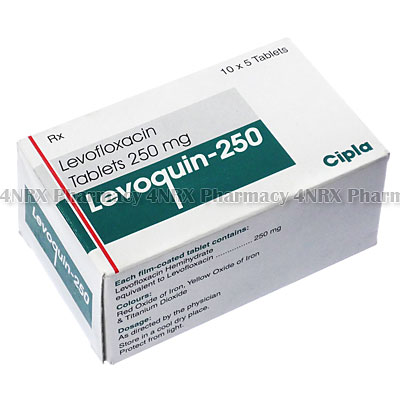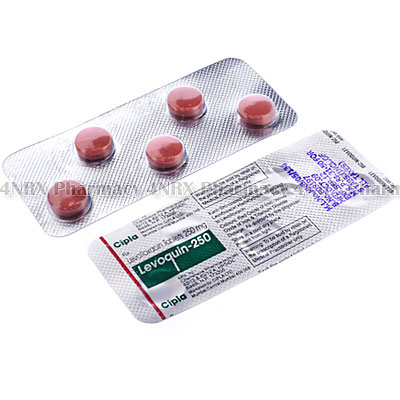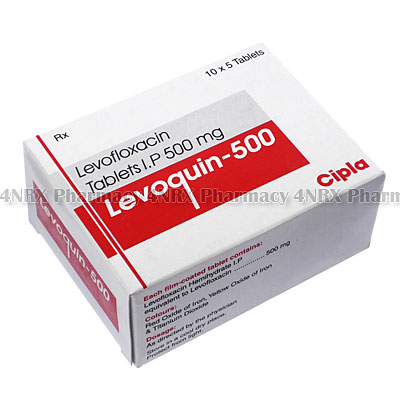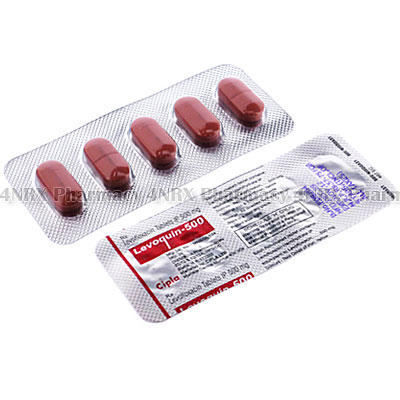 |
Home  Infection Infection  Levoquin (Levofloxacin) Levoquin (Levofloxacin) |
|
|||||||||
|
|
Levoquin (Levofloxacin)
What is Levoquin (Levofloxacin) used for? Levoquin (Levofloxacin) is a fluoroquinolone antibiotic used to treat a wide variety of bacterial infections. The medication destroys the bacteria cells or prevents their reproduction allowing the immune system to eliminate the infection naturally. Commonly treated conditions include bronchitis, pneumonia, sinus infections, prostatitis, or urinary tract infections. Your physician may also prescribe it to treat other conditions that are not listed here. How should I use Levoquin (Levofloxacin)? Follow the directions of your physician while using Levoquin (Levofloxacin) to get the most effective results from treatment. One tablet is normally taken two to three times each day for a cycle of medicine lasting one or two weeks, but your individual instructions may differ based on the condition being treated, the severity of your symptoms, and your current health. These tablets should be swallowed with a full glass of water and may be taken with or without food. Never change the form of the tablets by splitting or crushing them as this may destroy or alter the effects of their contents. Ask your physician any questions you have about the medication to ensure the correct usage. What are the side effects of Levoquin (Levofloxacin)? Some patients using Levoquin (Levofloxacin) have reported experiencing side effects such as:
More serious side effects that may occur during treatment are sensitive skin, confusion, faintness, numbness affecting the extremities, severe headaches, joint pain, urinary retention, any sign of a skin rash, bloody diarrhea, darkened urine, discolored stools, or jaundice. Inform your physician about any severe or worrying symptoms you experience to make sure the correct alterations are made to your regimen to prevent further problems including lower doses, reduced application frequency, or emergency medical attention in more serious cases. Please Note Do not begin using Levoquin (Levofloxacin) if you are breastfeeding, pregnant, allergic to quinolone antibiotics, or if the patient being treated is under the age of eighteen. Also inform your physician if you are elderly, using other corticosteroid medications, or if you have diabetes, myasthenia gravis, history of seizures, heart disease, porphyrias, slowed heart rate, low levels of magnesium, low potassium levels, history of psychiatric illness, decreased kidney function, or if you have recently had an organ transplant. These conditions may cause unexpected complications during treatment requiring special adjustments to your regimen. Strictly follow all instructions provided to you by your physician or pharmacist while using Levoquin (Levofloxacin). Optimum and safe dosage can differ based on the patient and the condition being treated. As this medication may be unsafe for certain patients, it is essential you always inform your physician if you are pregnant or breastfeeding, as well as if you have any allergies, other illnesses, or ongoing health conditions, and if you are taking any other form of medication, supplements, or herbal products. Immediately seek emergency medical care if you have an allergic or hypersensitive reaction. Common signs of a reaction include hives, swelling, skin rashes, chest pains, as well as trouble breathing or swallowing. 



|
||||||||||||||||||||||